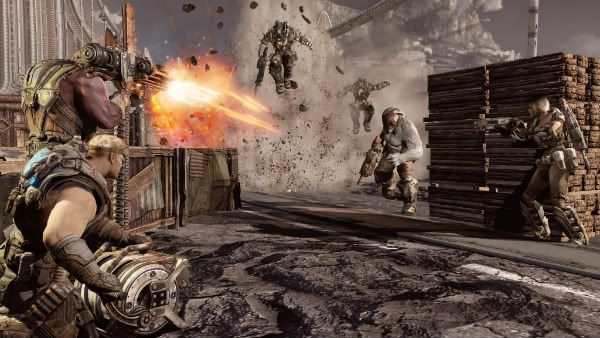This post has not been edited by the GamesBeat staff. Opinions by GamesBeat community writers do not necessarily reflect those of the staff.

I would have never thought that the most original multiplayer I’d play this year would come from Dark Souls.
I remember a time when I could get unique multiplayer experiences from different games, even within the same genre. If Halo 2 got boring, I could pop in Ghost Recon Advanced Warfighter or Battlefield 2, and they would feel entirely different.
Last generation, first-person shooters were already dominating the market, but the few non-FPS releases that went online were fresh and unique. Splinter Cell’s Spies vs. Mercs, one of my favorite multiplayer modes of all time, was spectacularly different. Burnout 3 brought its explosive gameplay online and was a nice change of pace from the more-hardcore titles.
It was clear then that online multiplayer was the future. As the next generation approached, I couldn’t wait to see unique multiplayer offerings from different genres.
Well, I’m still waiting.
Just about every title released nowadays has some sort of competitive-online offering. This would be wonderful if the game-type-by-genre approach and me-too mindset didn’t make everything feel similar.
One example would be Call of Duty 4: Modern Warfare’s ranks and rewards system, which has been repeatedly emulated ever since.
If a game’s multiplayer is fun and engaging, then that’s all I need. Developers don’t have to throw icons, emblems, badges, medals, titles, or other arbitrary decorations at me in a shameless attempt to keep me playing.
For the first time in my life, I’m sick of unlocking things. Besides, it doesn’t take skill to unlock them. It takes time — time I’d rather spend playing something different. Developers have adapted this system to different game genres, in many cases as a jarring disconnect from the single-player.
Assassin’s Creed: Brotherhood and Uncharted 3 both stand out from the brown-and-gray shooter crowd, but for some reason, they still contain Call of Duty-style leveling systems. The influence from Activision’s popular franchise isn't limited to rewards, it also affects aesthetics.
Points and killstreak rewards pop up on the screen, although they would never come up during the games’ single-player campaigns. Killfeeds and scores look all too similar to their shooter counterparts. Assassin's Creed and Uncharted's single-player experiences look and play great without the FPS tropes. So why are their multiplayer modes so much like everyone else’s?
Defensive game types, such as Gears of War’s Horde and Call of Duty’s Zombies, are also on the rise.
Horde mode is the most fun I’ve had with Gears of War 3. Its fun, however, will wear off after several games clone the scenario. Call of Duty: Modern Warfare 3’s Survival mode may be similar to Horde, but it still fits Call of Duty much better than Zombies ever did.

The problem is when titles like Mass Effect 3 feature wave-defense co-op. Whether you think Mass Effect needs multiplayer or not, a cookie-cutter Horde option doesn’t do it justice, especially when Bioware has crafted a universe so epic and compelling.
I play multiplayer for the dynamic and unique experiences I won’t always get from a game’s single-player campaign. Now that these campaigns are taking a backseat to online gameplay, I fear I’m going to play more of these tacked-on modes. More killstreaks. More experience points. More waves of enemies.
More of the same.
